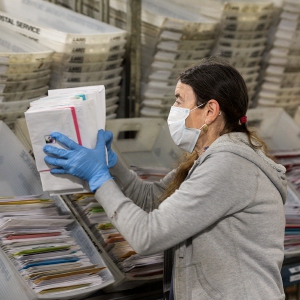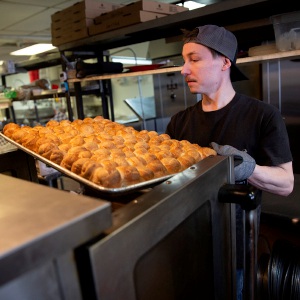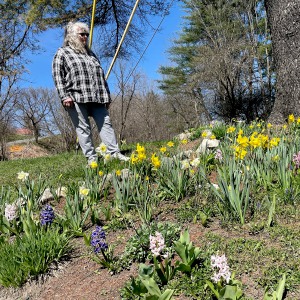Theater Review: Shaker Bridge’s ‘The Cake’ juggles humor and pain
| Published: 01-31-2024 9:00 PM |
Oscar Wilde wrote in his play “A Woman of No Importance” that “after a good dinner, one can forgive anybody, even one’s own relations.” Replace “dinner” with “dessert,” and you’ve nailed down the sentiment of Shaker Bridge Theatre’s newest showpiece, “The Cake.”
A comedy at its core with a nice thick layer of drama, “The Cake” raises topical questions about sexuality, sugar and navigating political divisions between loved ones while leaving you chuckling well past the final bow. The play, directed by Ohio native Jammie Patton, is the third production of Shaker Bridge’s 16th season and the company’s first in the Briggs Opera House in White River Junction.
Written by Bekah Brunstetter, “The Cake” was inspired by events from the Supreme Court case Masterpiece Cakeshop v. Colorado Civil Rights Commission, which involved a baker’s refusal to make a wedding cake for a gay couple. As such, the story follows the vivacious Della Brady (LeAnne Hutchinson), owner and sole baker of Della’s Sweets in North Carolina, who discovers that Jen (Stephanie Israelson), whom she loves like a daughter, is newly engaged and seeks her out to be the cakemaker. The catch? There will be two brides at the altar.
Southern Christian Della does not react well to this news. The raw discomfort of her disapproval of the marriage between Jen and her fianceé, Macy (Heather Holmes), is seen through physical distance between the actors onstage and stressful silences, which seem particularly long after the rapid-fire dialogue of previous scenes. Della claims an overbooked season six months in advance, and Jen crumbles, having held onto the hope that Della, as her deceased mother’s best friend, would accept her. Macy and Jen leave, but Della’s decision to forgo the cake, and with it her beloved Jen, comes home with her, and she begins to question her own sexually barren relationship with her husband, Tim (Bill Chappelle). This dilemma sends her into a spiral.
The script includes a liberal amount of monologues from Della, so the success of the production relies heavily on LeeAnne Hutchinson’s ability to lead the way. Fortunately, Hutchinson — a Shaker Bridge regular — delivers a spectacular performance, teeming with undeniable charisma and comedic physicality. Played incorrectly, Della might easily have come across as cloyingly saccharine, but through Hutchinson’s expertise, Della’s journey from pinned-up, sugary Southern baker to a slightly unhinged but self-realizing woman is made sympathetic. Chapelle also stands out as Della’s husband and human La-Z-Boy, Tim, and the couple’s scenes together are comically electric. At last Thursday night’s performance, they sent the audience into peals of laughter lasting far past scene changes.
Though quick wit can be credited as the most powerful force in this play, the strength and impact of the heavier scenes are, for the most part, effective. As Jen continues to press in on Della, still holding out for the approval that she was never able to get from her late mother, we see Della battle with the part of her that loves Jen deeply and the part that cannot understand her full identity. Similarly, when Macy challenges Jen about her continued search for Della’s change of heart, Jen is forced to see her upbringing and the biases it raised her with in a harsher light. No longer does it seem feasible that her childhood and her adult life can coexist peacefully. Macy potently reminds her that “nostalgia is not a belief system.”
However, one of the most poignant lines is delivered by Della herself, when she comes to understand that she craves love and affection in her own marriage and that desires have been woven with guilt by way of her Christian upbringing. She compares her realization to the moment when, in the Bible, Eve becomes fully aware of her nakedness. “The nudity of Eve … it’s my inheritance. It’s shame.”
Patton, an African American woman who identifies as part of the LGBTQ community, was raised with Baptist beliefs in Youngstown, Ohio, and she speaks to the difficulty of navigating relationships with inflexible loved ones in her Director’s Note: “I know firsthand the cognitive dissonance of realizing who you are, what you feel, but being judged by people you love who are ‘praying for your soul’ to be saved from eternal damnation,” she writes. “It’s a serious tug of war on the mind and spirit.”
Article continues after...
Yesterday's Most Read Articles
 Dartmouth administration faces fierce criticism over protest arrests
Dartmouth administration faces fierce criticism over protest arrests
 West Lebanon crash
West Lebanon crash
 Plan on track to ship Upper Valley mail to Connecticut for sorting
Plan on track to ship Upper Valley mail to Connecticut for sorting
 Lebanon’s Jewell back from auto accident, more aware of ‘drowsy driving’ dangers
Lebanon’s Jewell back from auto accident, more aware of ‘drowsy driving’ dangers
 Longtime employees buy West Lebanon pizzeria
Longtime employees buy West Lebanon pizzeria
“The Cake” is successful as a comedy and evokes refreshing questions about internalized bias, which is a byproduct of living and working in a society that does not favor the marginalized. The set itself is prim, clean and compact and is swiftly chopped and changed by stagehands between scenes. The palette of the bakeshop is decidedly pastel, reminiscent of 1970s baking shows, and the costumes are simple and straightforward. The real stars of the show however, are the writing and acting.
Brunstetter’s knack for comedic writing overshadows the heaviness of the dramatic scenes, which is a good thing, because the rub of the play lies in the difficulty of finding the right place to wrap up. Far past the spot in which Brunstetter’s script has driven her points home, the characters continue to argue, and as a result, some meaning is lost. The audience was unsure, communicated through a few confused claps here and there, which scene would end the nearly two-hour performance because many of the final scenes seemed appropriate conclusions. It attempts to juggle raucous humor and profound, painful topics, which is a hefty task to get to the core of if the audience is bent over wheezing most of the time.
Shaker Bridge Theatre’s production of “The Cake” runs through Feb. 4 in the Briggs Opera House in White River Junction. For tickets ($18-40) or more information, go to shakerbridgetheatre.org.
Caoimhe Markey is a freelance writer. She lives in Woodstock.

 Art Notes: Canaan Meetinghouse showcase brings musicians and listeners together
Art Notes: Canaan Meetinghouse showcase brings musicians and listeners together A Look Back: Upper Valley dining scene changes with the times
A Look Back: Upper Valley dining scene changes with the times The future of fertilizer? Pee, says this Brattleboro institute
The future of fertilizer? Pee, says this Brattleboro institute From dirt patch to a gateway garden, a Randolph volunteer cultivates community
From dirt patch to a gateway garden, a Randolph volunteer cultivates community 
